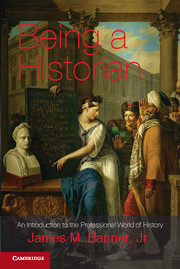Book contents
- Frontmatter
- Contents
- Preface
- Acknowledgments
- 1 The Discipline and Professions of History
- 2 The Structure of the Discipline of History
- 3 A Multitude of Opportunities
- 4 The Academic Trinity
- 5 History outside the Academy
- 6 Teaching and Writing History
- 7 Professional Principles, Responsibilities, Rights
- 8 Being Oneself as Historian
- Index
Preface
Published online by Cambridge University Press: 05 June 2012
- Frontmatter
- Contents
- Preface
- Acknowledgments
- 1 The Discipline and Professions of History
- 2 The Structure of the Discipline of History
- 3 A Multitude of Opportunities
- 4 The Academic Trinity
- 5 History outside the Academy
- 6 Teaching and Writing History
- 7 Professional Principles, Responsibilities, Rights
- 8 Being Oneself as Historian
- Index
Summary
If I intended this book to introduce readers to the nature of historical knowledge, I would entitle it, after Peter L. Berger's Invitation to Sociology, “An Invitation to History” or, after G. H. Hardy's Mathematician's Apology, “A Historian's Apology.” If I sought to counsel aspiring historians about how to pursue their work, I would follow P. B. Medawar's Advice to a Young Scientist with my own “Advice to a Young Historian.” If my purpose were to reflect on how historians create and present historical knowledge, I would follow the path blazed more than seventy years ago by Allan Nevins's Gateway to History and try to capture again what Nevins so bracingly and infectiously termed history's “free and joyous pursuit.” Or if I wished to examine historical scholarship today, I would adopt the approach of John Higham's essential study, History: Professional Scholarship in America, and appraise the internal growth, intellectual development, and overall intellectual condition of the discipline of history. But I have written this book for other purposes and for other kinds of audiences than those to whom those authors directed their wise and enduring works.
Instead of being a welcome to readers who might like to learn something about the house of history from the outside, these pages are meant for people who wish to learn of history's dwelling place from within. I have two groups of readers especially, although not exclusively, in mind. The first are those, principally graduate students, who have already stepped through Clio's front door and now have need of guidance within her residence – guidance on many matters too seldom offered to them. The second are more experienced historians – and, as readers will see, I define that term broadly – who might find that what I write affects the ways in which they view our shared discipline, its condition, and our work as professionals.
Information
- Type
- Chapter
- Information
- Being a HistorianAn Introduction to the Professional World of History, pp. ix - xviiiPublisher: Cambridge University PressPrint publication year: 2012
